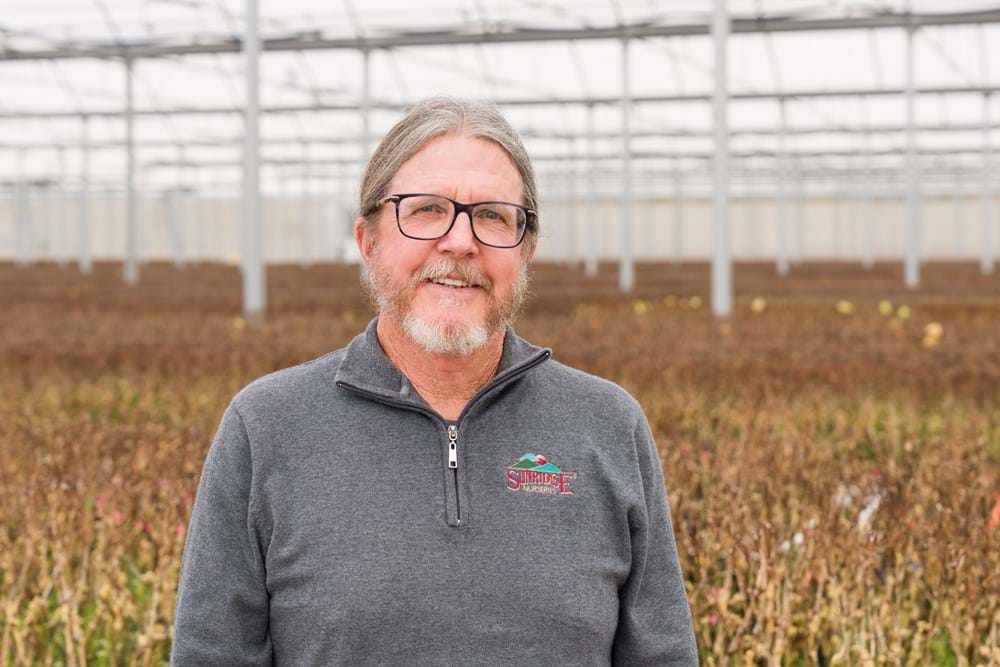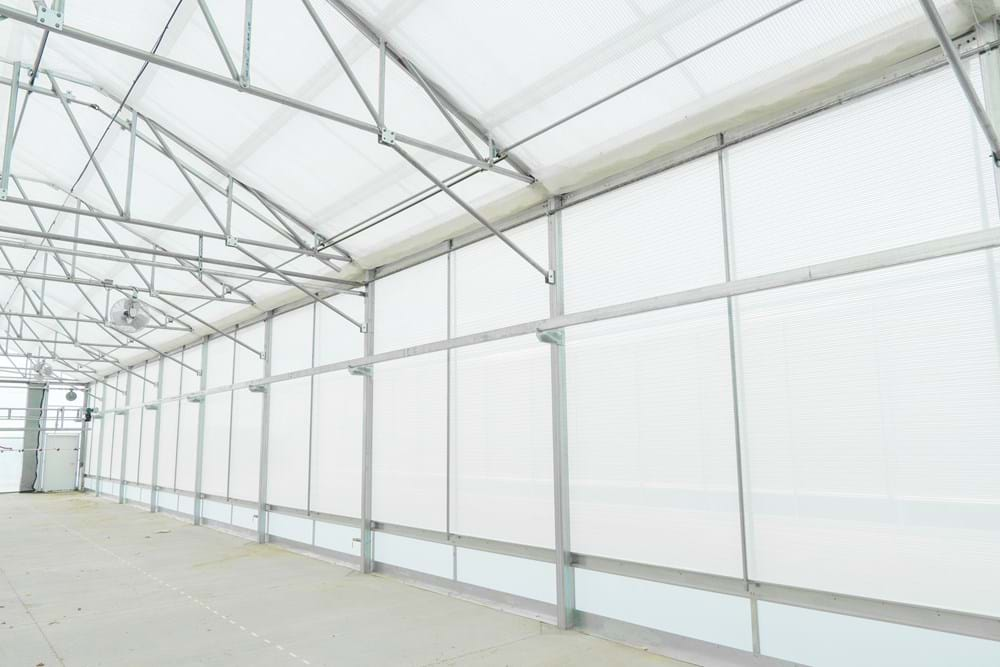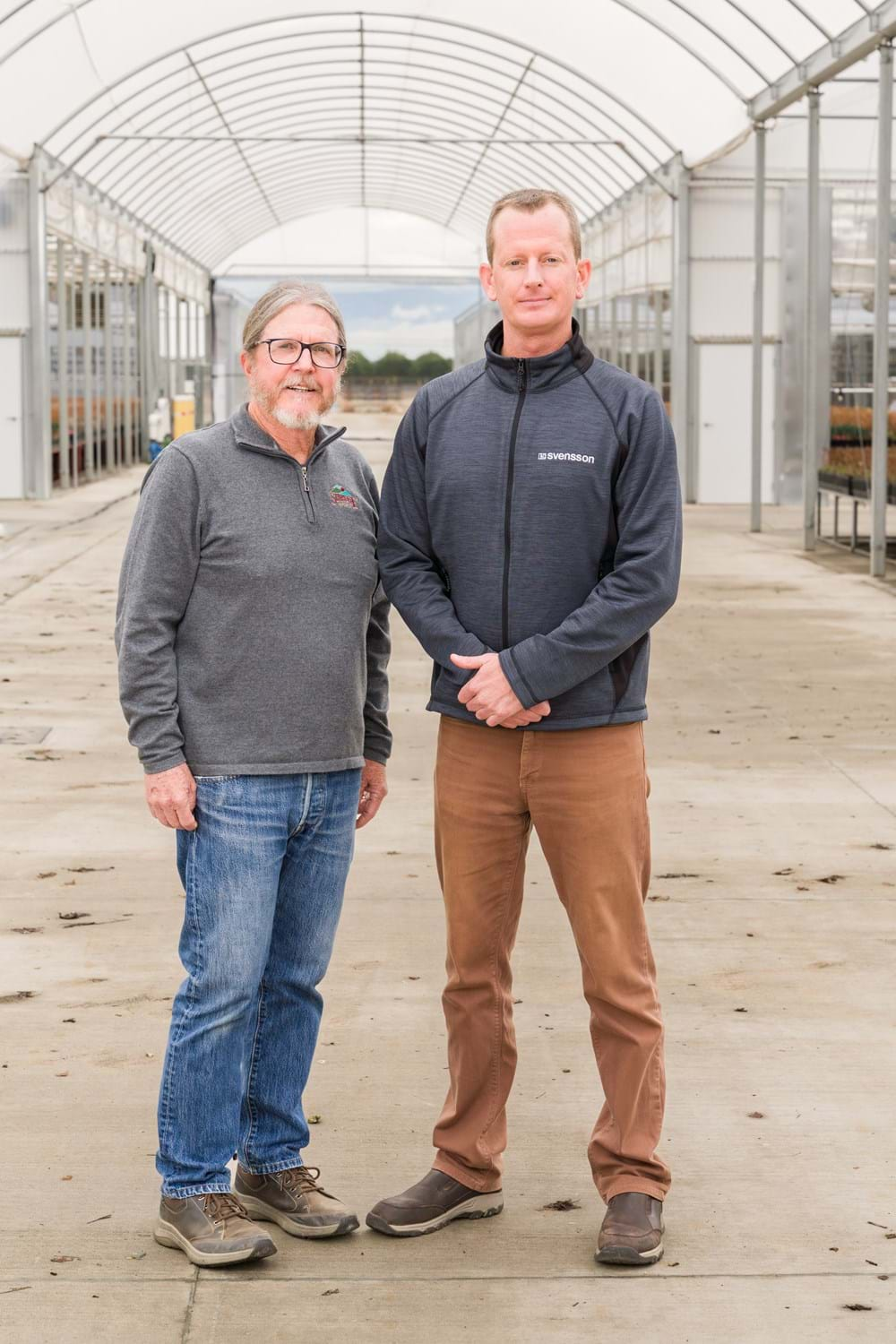“Talk to the professionals and try something new,” says Michael Vietti. “Slowly transition by doing side-by-side trials. Start with just one bay and see how it goes.” When the Svensson Harmony trial results were in Vietti realized the hunch had paid off, he decided he didn’t want to keep what he’d learned to himself.
“We never really thought we would see a 7–10-day reduction in cropping time. This has almost doubled the growth cycles and increased crop quality” he says. “If you have an increased even light spread at the beginning of the crop cycle that penetrates the crop canopy, this also cuts down on a number of issues such as crop loss due to disease, and additional labor,” he says. The scattered light penetration the Harmony provides has been especially beneficial when you are limited to closely placed crop spacing "he says.
Vietti works as Director of Quality at Sunridge Nurseries. This is a flagship vine propagation company since 1977 and has grown to be one of the largest suppliers of a mass variety of grapevine starters in the U.S.
Working on what will be his last year in the business, Michael says he feels he owes a lot to the greenhouse sector.
“I feel a responsibility to the industry and to other growers,” he says. “I want to share what I’ve learned through trialing new ideas... You can’t get the results we have seen with the standard shade curtains” he adds.

Michael Vietti works as Director of Quality at Sunridge Nurseries.
Vietti earned a B.S. in Agricultural and Ornamental specialization at California State University, Chico and for 26 years worked all over California, from Bakersfield to Redding, often in smaller, family-owned ornamental and perennial nurseries where he held a variety of roles. In 2005, he moved to Duarte Nursery to specialize in container-based agriculture, which is where he started using Svensson equipment, before joining Sunridge Nurseries in 2016.
The nursery focuses on wine grape propagation, and they ship nationwide in the U.S., as well as to Peru and Mexico. Located in Bakersfield, at the southern end of the San Joaquin Valley, Sunridge has more than 600 acres (about the area of Central Park in New York City) of certified rootstock and outdoor nursery blocks and 300,000 square feet of growing, grafting and storage houses. Their green potted vines are grafted and shipped within the same season.
The harvest begins in late November and continues until the end of February. Grafting then gets started on New Year’s Day and goes on until the end of May. “The first challenge for a wine grape nursery is getting the root system started,” says Vietti. “If the scion has started growing, you’ve got about a week to ten days to see roots on the grafting stock, that’s the big challenge,” says Vietti. “That, and disease,” he adds. “Specifically powdery mildew, because they grow at high density and it’s hard to get airflow penetrating the crop canopy. Microclimates will increase that humidity”, he says.

Sunridge Nurseries is using Harmony 4215 O FR, Harmony 5747 FR, Harmony 3015 OE to control shade in their houses that propagate grape vines.
Thinking outside of the box
Vietti says the whole industry tends to grow in the same way, but that his background leads him to think not just of keeping the heat, but also leveraging the light.
So, when it was time to replace an existing installation from before his time, Vietti thought back to the various projects he had overseen with Agra Tech as a primary supplier and builder.
“We were certainly looking for energy curtains with heat retention – it gets cold in Central California,” he says. “It was Jim Bergantz at Agra Tech who suggested we try the closed structured Harmony 5747 FR,” says Vietti. “He said the quality was excellent for the dual functionality of energy savings combined unmatched light diffusion.”
Sunridge was not after the cheapest product, he stresses. “We wanted that whole package that comes with a higher quality plant. It might cost more, but it comes with a range of benefits such as energy savings from heating along with the proper light penetration allowing for shorter cropping times.”
How Sunridge use their screens
Michael Vietti says that the screen’s initial job is to control shade when the first potting takes place, but it needs to stay warm. The houses have an 85 °F (29.5 °C) minimum and the goal is to heat the air and the soil because higher temperatures generate a root more quickly.
Vietti says he’s seen the plants respond very well under the new screens: “They get leaf expansion without too rapid growth,” he says. “Our diffused double poly covering provided by AgraTech complements the harmony screen very well.”
Sunridge Nurseries also uses an exterior covering with a Harmony 3915 O E over the crop staging area – “so we can keep out all the heat and leverage the extra light.” “Applying a 39% shade level allowed for ideal light transmission," he says, while also controlling the insects. Their principal critter is the Glassy Wing Sharpshooter, and this pest is the main reason wine grapes are not grown outside in the valley. “The special exterior open weave Harmony has helped as a triple benefit to keep the insects out and also allow for improved ventilation and cooler temperatures,” he says.
Key results
Vietti says the Harmony cropping and production time was reduced by 7-10 days (about 1 and a half weeks): “The plant came with a noticeably higher quality and consistent growth between all starters” he says. “Greater light transmission along with the even light scattering the diffusion aspect offers equals higher crop quality. We saw thicker leaves and that were less prone to disease.”
The current configuration at Sunridge means Vietti can compare a previous range with Harmony 5747 FR and a single polycarbonate roof, to the new ranges with Harmony 4215 O FR and double-glazed diffused roofing.
“It all goes back to the crop quality,” he says, “and less time in the greenhouse. We were able to double the use we got from the upgraded houses – we turned more cycles in the houses with the Harmony combined with diffused poly roofing compared to the other houses.”
With multiple Harmony models at play, the Harmony O E model has also been extremely beneficial as the primary roofing for the crop staging area. “You get the shade in the summer months without sacrificing air exchange,” he says, adding: “Worker protection is huge!”
Michael Vietti says the younger grower he once was does not have to risk everything on a new growing strategy. It works to start small. “Talk to the professionals and try something new,” he says. “Slowly transition starting with smaller controlled experiments and see how it goes,” he adds.
Whether it is screens or lights, Vietti says growers need to continue advancing alongside the technology that is out there. “And run trials!” he repeats. “Don’t just do what you’ve always been doing.”

Michael Vietti of Sunridge and Svensson West Coast Sales Manager, Matt Newell.
Sunridge Nurseries and Svensson
 |
Advantages per Harmony models between applications Harmony 4215 O FR - Propagation Houses (combined with Agra Tech's double diffused poly roofing)
Harmony 3015 O E - Exterior Staging Houses
Harmony 5747 FR - Propagation Houses
|
